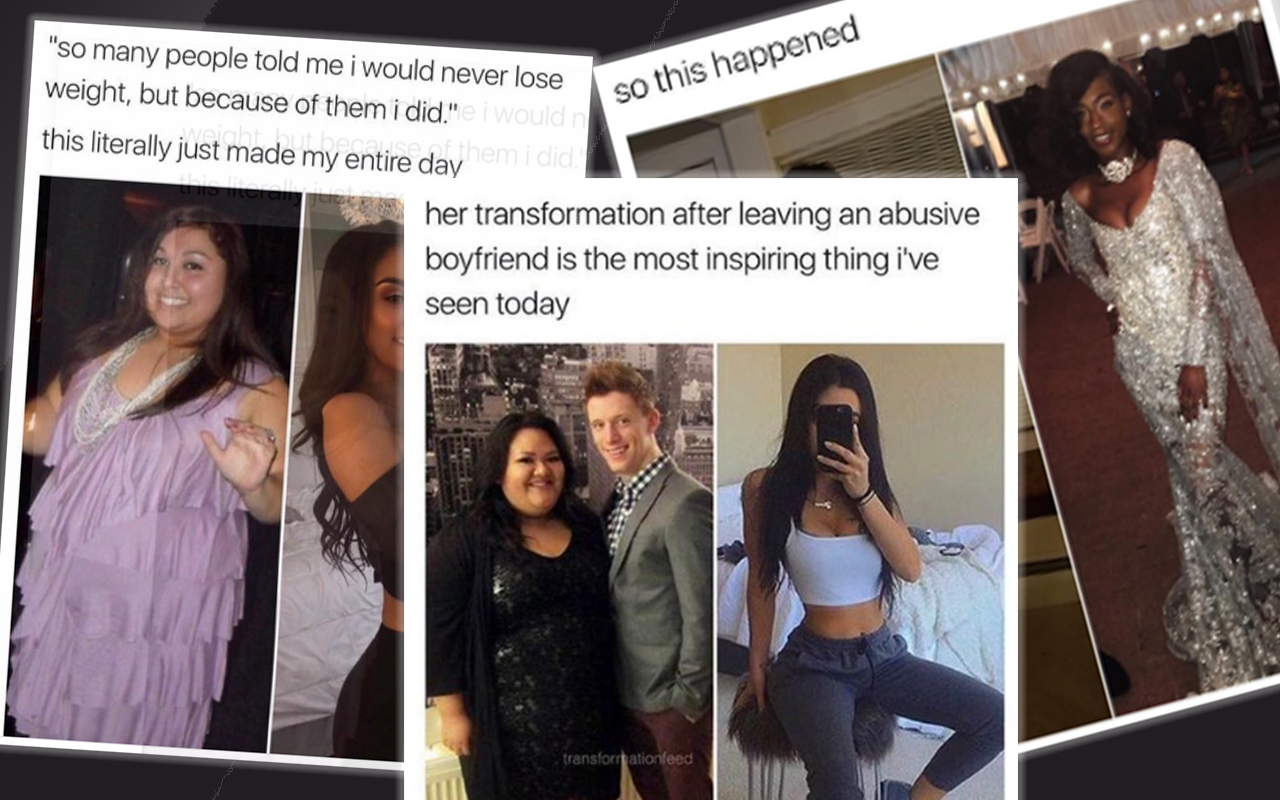
The internet loves a glo up. Technically, they began before the term was even invented.
“Before” and “after” pictures of people transforming from ostensibly unattractive to ostensibly attractive were some of the first spam on the web (Doctors hate her!). Nowadays, there’s an entire subreddit dedicated to former “ugly ducklings” and on Twitter, people share their transformations every day with the words “glo up”. These posts are often seen to be life-affirming, and can accumulate hundreds of thousands of shares.
Which is great – when they’re real.
Over the last few weeks, a handful of Instagram profiles have been widely condemned across the web. Accounts such as @relationships.usa, @transformationfeed, and @course have been stealing people’s pictures and posting them with fake, emotionally manipulative captions.
When a Twitter user who goes by Anthony Ochoa posted two pictures of himself and his sister online, Transformationfeed stole the images and rewrote the caption to pretend that Ochoa’s father had died. The post got more than 20,000 likes.
These accounts, incidentally, also love a glo up.
BRO WHAT pic.twitter.com/aM4KJQBeuc
— Anthony Ochoa (@ochoa__06) June 10, 2017
“I started getting a ton of notifications on my Instagram,” says Amaya King, a 17-year-old whose picture was reposted by Transformationfeed. A few months ago, the account stole a picture that was taken two years ago at Amaya’s homecoming dance. They Photoshopped her arms and waist to make her look larger, before uploading the image next to a photograph of a tall, slim woman in a silver sequinned dress. “So this happened”, was the caption.
When a random insta account photoshops a pic of you then transforms you into someone who isnt even you pic.twitter.com/ZPq8YlF1ml
— amaya (@amaya_king8) May 23, 2017
“They claimed that I was someone I wasn’t… At first I found humour in the fact that out of all the accounts in the world the account picked my picture,” she says. “But I was also upset that my picture was used without my consent and I was portrayed as something I wasn’t.
“I personally have struggled with weight and insecurities about my weight all my life and to see these posts just was disappointing.”
Having your image stolen to be a “before” is a naturally upsetting thing. Amaya thinks accounts that steal – or make up – transformations are “degrading”, and that people should be left alone to share their growth themselves. “It takes a strong person to not care about what others think, especially on social media. And overall this experience has taught me that as long as I am confident in myself and love myself, all other opinions are irrelevant.”
No, Transformationfeed, I am not this person’s before picture and am happily married. Would have commented on this but the option was off. pic.twitter.com/4cvibd2gQo
— Gloria Shuri Henry (@Glowpinkstah) December 30, 2016
Amaya doesn’t know the lady in her fake “after” picture. Being held up as an aspirational “after” might seem like a compliment, but 22-year-old Janelle Mughannam was upset when her picture was stolen by Transformationfeed. Placing her image next to a woman she did not know, the account stole her selfie and captioned the post: “So many people told me I would never lose weight, but because of them I did.”
“The girl on the left is a different person. I found it super disrespectful to this girl and me,” says Janelle, who repeatedly commented on the picture to say it was fake, but had her comments deleted by the account.
“It’s not OK… They’re creating false hope and lies just to get some likes. It’s super misleading and just so rude. A lot of things are fake online but most people are gullible and believe it.”
Janelle says she was flooded with messages from people asking her how she lost the weight (“I had to explain to them that I’ve always been a pretzel stick”).
Yoooo they did it to me too And that’s not even me on the left LMFAO pic.twitter.com/PNmxb3g4f1
— cocopuffs (@cocojanelle_) June 12, 2017
Neither Transformationfeed nor Relationships.usa responded to a request for comment. Instagram also declined to comment on the accounts.
A thorough investigation by Rachael Krishna for Buzzfeed News found that many of these accounts that steal pictures are in fact affiliated, and share pictures with one another. The accounts are run by teenage boys.
The boys told Krishna these thefts were a mistake – and didn’t go into their motivations for stealing and misrepresenting other people’s photos. Nonetheless, a cursory glance at the accounts shows money is involved. Relationships.usa has a link to an online store called “Malistica” on its profile, and frequently posts pictures of jewellery that can be found on the site. By building up a high number of followers with fake pictures, these accounts can strike deals with brands to promote their products in return for a fee.
Picture theft is as old as the internet itself. From catfishing to “1 like = 1 prayer”, people have always taken others’ photos for malicious means. Yet this new trend risks damaging teenagers’ self-esteem, and it creates potentially troublesome back stories that could follow them across the web.
*/




